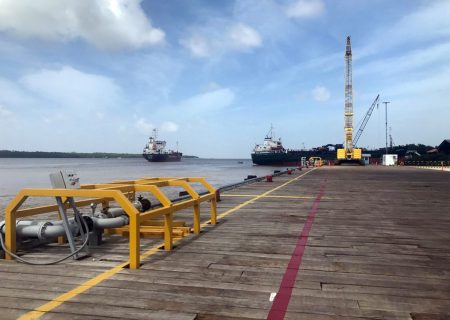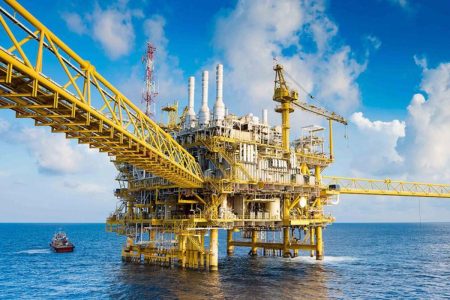
Houston — The final day of the Offshore Technology Conference in Houston, Texas commenced with a joint discussion from industry giants Shell and Occidental (“Oxy”). In a session titled “Artificial intelligence, real-time monitoring, automation and big data,” Shell’s Gulf of Mexico Safety Manager, Neisha Kydd, and Oxy’s Director of Enterprise Architecture & Emerging Technologies, Mansoor Nazar, discussed the ways their companies utilize artificial intelligence, automation and robotics in safety spaces, the limitations of these technologies, and the future of AI in their respective companies and the offshore industry as a whole.
Artificial intelligence is a key component in reducing safety incidents. As the guiding force of Shell’s safety department, Neisha Kydd outlined ways that Shell uses artificial intelligence. Kydd referred to Shell’s exception-based surveillance as proactive monitoring “on steroids,” using complex algorithms for early detection and intervention for equipment failures and looming safety incidents. This predictive technology keeps people “out of the line of fire.”
Kydd asked the audience to think of exception-based surveillance as the dashboard of a car. While the driver monitors things like fuel and speed, they’re unable to track engine performance, fluid levels, etc. Drivers rely on their dashboards to alert them to problems under the hood.
Shell’s exception-based surveillance acts as a “dashboard” for offshore operators and their workforce. By closely monitoring conditions and detecting anomalies, this form of artificial intelligence can alert to an issue before it becomes a safety hazard.
According to Kydd, artificial intelligence is helping Shell close gaps in its safety policies. Through a study conducted in 2022, Shell looked into past safety incidents and found that most occurrences happened in auxiliary systems. The company also found that certain equipment processes in the field were not up to par. The challenge is finding ways to implement safety theories developed in an office to the real, hands-on work happening in the field. Closing this gap using AI and automation is Shell’s next primary focus.
Companies can achieve scale through the use of artificial intelligence. As a last-minute sub-in for Oxy’s scheduled speaker, Janos Hidrowoh, Director of Major Projects, Mansoor Nazar left no stone unturned when discussing how his company is leveraging automation and artificial intelligence.
According to Nazar, one of the offshore industry’s biggest problems lies in bringing things to scale. AI allows companies to prepare for incidents in real-time, eliminating guesswork that often occurs when bringing new concepts to the field. While predictive analytics isn’t a new concept, systems are so advanced now that they can teach themselves. This helps operators plan for the unexpected, and therefore reduce unplanned safety events.
When it comes to automation, Oxy is leading the charge. Nazar outlined several projects in the works and on the field. Robots and drones will soon replace the human element in potentially hazardous environments, removing them from danger and allowing people to focus on more productive work. Equipping existing infrastructure with high-resolution cameras and video analytics will help detect problems such as corrosion. Operators can even apply AI to subsea operations by using remote-operated vehicles (ROVs) to detect leaks.
Oxy is currently working on building a cloud-based foundation and building their data ops department to utilize artificial intelligence more efficiently. The company is also working on outfitting field engineers with visual tools and analytics software to enable real-time reporting.
The road to AI and automation isn’t without roadblocks. Like all innovations, implementing automation and artificial intelligence into offshore operations comes with many challenges. Operators must process tremendous amounts of data, requiring computing power that comes with a hefty price tag. AI also requires a lot of bandwidth, which can be difficult to maintain.
However, the highest hurdles oil and gas companies must face regarding artificial intelligence are privacy, cybersecurity and ethics. AI isn’t immune to biases, especially those of its programmer. Any technology that utilizes computers poses a cybersecurity risk, too. Oxy formed a cross-department committee to investigate these issues and form policies, and other companies would be wise to follow suit.
The future of artificial intelligence and automation for the offshore industry. The future is bright for these rapidly evolving technologies. For Shell, the future looks like uniting data centers, building subject matter expertise and becoming a “learning organization.” For Oxy, the company will continue exploring the ethics surrounding offshore AI while developing products and building a “connected” workforce equipped with the latest technology.
Both speakers stressed that artificial intelligence and automation should be seen as technologies, not products. To use these systems responsibly, companies must accept that technology isn’t meant to replace fundamental disciplines; they are meant to enhance them.
*Bethany Fischer, Digital Editor, World Oil
Follow us on twitter



